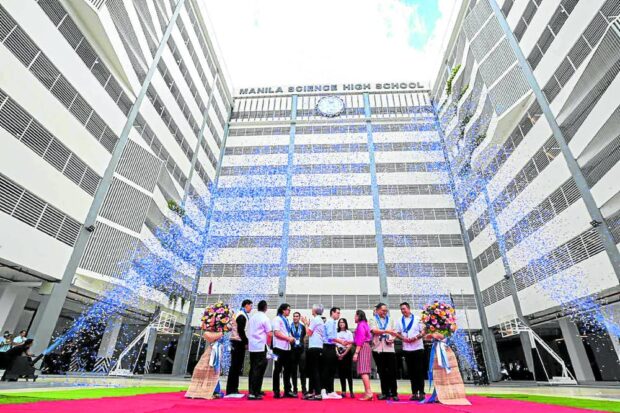Manila Science HS gets new 10-story building

NEW ERMITA LANDMARK Manila city government and education officials mark a milestone for the country’s first science high school on Thursday. —PHOTO FROM MANILA.GOV.PH
The city government of Manila has turned over a newly constructed 10-story building to Manila Science High School (MaSci), the first public school to use a structure of such height in the country.
It was a milestone for MaSci, which was established in 1963 as the first science high school in the Philippines.
Located at the corner of Taft Avenue and Padre Faura Street in the Ermita district, the building is designed to have a total of 158 classrooms, space for up to 16 offices, a library, an auditorium, a basketball gym and roof-deck area for other sports, and a canteen. It is also serviced by five elevators.
35 per classroom
The P1.3-billion building began construction during the term of then Manila Mayor Francisco “Isko Moreno” Domagoso, who was present at Thursday’s turnover rites with incumbent Mayor Honey Lacuna.
The auditorium is named after Joaquin Domagoso, in honor of the ex-mayor’s father.
Article continues after this advertisement“I’m happy for the students,’’ Domagoso said. “I hope you can excuse us for the hardships that you faced during those two years of online classes. I hope [the new building] is worth the wait.”
Article continues after this advertisementCity Hall earlier said the new building is expected to serve more than 5,500 students, at around 35 students per classroom.
READ: Isko Moreno leads groundbreaking ceremony for 10-story grade school building
World-class
“Your school can now achieve the universally acceptable student-teacher ratio in a very good (learning) environment,” Domagoso added.
For Lacuna, having a “world-class facility” is just “fitting’’ for a school that has consistently produced exemplary graduates.
“Today we are making history … as the first to have a state-of-the-art, 10-story science high school in the Philippines,” said MaSci principal, Manolo Peña, during the turnover ceremony.
“This is not just a simple infrastructure (but also) a symbol of our dedication to improving the quality of education. These walls would contain the beginning of dreams, studies, and experiences toward a better future,” Peña added. —Gillian N. Villanueva